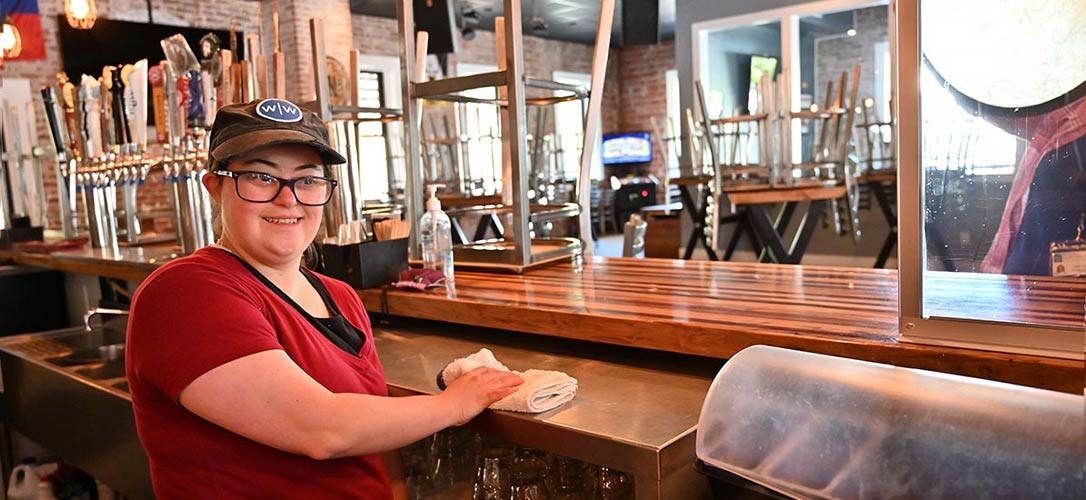Watauga Opportunities: Community cornerstone celebrating 50 years of operation
Posted: July 25, 2024

Cassidy Narron – Wataugademocrat.com
Jun 22, 2024
BOONE — Watauga Opportunities Inc., one of Watauga County’s largest employers, is celebrating 50 years this year.
“During the past 50 years, much has changed in terms of services, systems, and expectations; however, one constant has always been the stability of our mission-driven, high-quality, leading-edge services,” said President and CEO of Watauga Opportunities, Michael Maybee. “ The ability of Watauga Opportunities to continue this service through continuous change is credited to the efforts of a knowledgeable, dedicated and visionary Staff and Board — we look optimistically toward a future which continues our tradition of excellence.”
Watauga Opportunities Inc. is a manufacturing company and nonprofit support center for adults who have barriers to employment and community inclusion. It manufactures a variety of products, including FDA-approved medical devices, molded plastic products, and packaging. During the COVID-19 pandemic, Watauga Opportunities Inc. produced more than 15 million sample collection vials that were used all over the country.
The manufacturing plant opened in 1979. Whereas a typical manufacturer would give shareholders excess revenue, the excess revenue generated from Watauga Opportunities manufacturing goes back to the nonprofit services.
Maybee started working at the company in 1989, serving as the program coordinator. The following year he began the Supported Employment Program. The program’s mission is to help people with physical and cognitive disabilities find jobs doing something they were comfortable with and enjoyed.
“Many times, people think the people we work with are not capable of doing jobs, but what they don’t recognize is that they just have a longer learning curve,” said Maybee.
Watauga Opportunities Inc. has two group homes. Each home houses six adults with developmental disabilities and provides them with a long-term, stable living environment. Half of the residents in each home have been living there for more than 30 years. Maybee himself worked in group homes full-time while in college.
Watauga Opportunities Inc. was founded by Spears Alexander in 1974. Alexander worked for North Carolina’s Developmental Disability Council and opened several centers similar to Watauga Opportunities across the state. He lived in Boone and ran Watauga Opportunities himself for many years.
“Lots of times there were families who had kids with disabilities, and in the fellowship halls of churches would have programs for them,” said Maybee. “Unfortunately, many times people with cognitive disabilities were placed in state institutions and it was just a difficult time for them.”
The 1960s and 70s were a time of gradual change in the stigmatism around disabilities and how society considered those with physical and cognitive disabilities. Maybee said that Geraldo Rivera’s exposé of the horrific living conditions for disabled residents at Willowbrook State Developmental Center in 1972 was a turning point in shifting how a majority of society believed disabled people should live, and a subsequent process of deinstitutionalization took place throughout the following decades.
“Many times, people think the people we work with are not capable of doing jobs, but what they don’t recognize is that they just have a longer learning curve,” said Maybee.
The Supported Employment Program hires job coaches to work with local businesses to learn a job. Over the course of several weeks or months, the job coach transfers the skills to their protégé. As time goes on, the job coach goes from doing 90% of the job to 50 to 30%, and eventually, the responsibilities of the job are completely transferred to the other individual. Maybee said this process ensures businesses that the job gets done and that the employee is trained in a way that is the most beneficial to them, without requiring the business to incur the extra training costs.
After landing a job, Watauga Opportunities staff maintain regular contact with the employee and employer to ensure long-term job retention. Job coaches are always available to retrain and resolve problems and act as liaisons between employer and employee.
“People don’t lose jobs because they can’t do tasks for the job, people lose jobs because something is askew in their life,” said Maybee “Our long-term follow along is about enhancing the person’s life. Making sure their life is full and complete. They may go to work for 2-3 hours at a job, but before work and after work, we have them engaged in a health and wellness activity as well as a civic engagement activity. We’re all happier when we are engaged with our community.”
The civic engagement activities not only provide people with disabilities a chance to get involved in the community, but Maybee said it allows the community to redefine their viewpoints on people with disabilities.
“Social change doesn’t come by force. It comes by cognitive dissonance. It comes from people thinking one thing and then viewing and experiencing something else and changing their mind because of the evidence they have before them,” said Maybee.
Since 1991, Maybee said the Supported Employment Program has placed more than 1,500 people in jobs.
“A summer ago, I helped the very first person placed in our support employment program retire after 30 years in the job,” said Maybee. “He and his wife paid off the mortgage on their home, and they have celebrated their 35th wedding anniversary — so when I’m talking to people about normalization, I’m like, ‘How many of you have retired, how many of you have paid off your mortgage and how many of you have been married for 35 years?’ Not too many hands go in the air. It’s just that people need to recognize that just because there is some sort of difference, we are more alike than we are different.”
For more information please submit our Contact Form and select your area of interest.
rss_feed View all MARC News
About MARC
MARC is a social enterprise model using self-funded manufacturing revenue to supplement the cost of economic and social quality of life services to people with disabilities and disadvantages.
